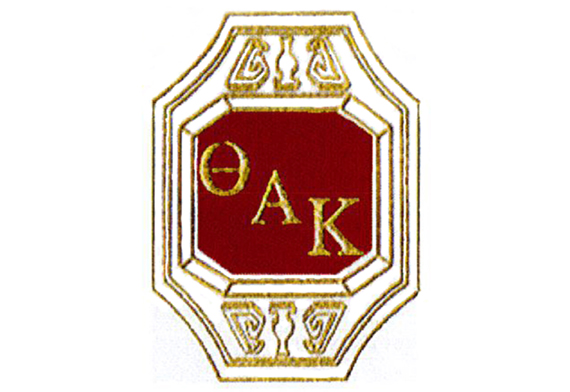 Elizabethtown College’s chapter of The National Honor Society for Religious Studies and Theology, Theta Alpha Kappa (TAK), hosted the campus’ first TAK lecture at 7 p.m. Tuesday, March 21. An induction ceremony for nine new TAK members preceded the talk.
Elizabethtown College’s chapter of The National Honor Society for Religious Studies and Theology, Theta Alpha Kappa (TAK), hosted the campus’ first TAK lecture at 7 p.m. Tuesday, March 21. An induction ceremony for nine new TAK members preceded the talk.
Kelly Knorr, a junior corporate communications major and religious studies minor, was among the students selected to join the College’s TAK chapter last year. “It was an honor to be recognized for my academic achievements and I thought it would be a great opportunity to be involved in an honors society with like-minded, hardworking individuals,” she said.
Students receive TAK nominations for holding a minimum 3.5 GPA in religious studies and a 3.0 GPA overall. They must also be ranked in the upper 35 percent of their class in general scholarship at the time of induction.
“TAK is an honors society for religious studies so it was a perfect next step for me to continue educating myself in an area that interests me so much,” Knorr said.
As a member of TAK, as well as the College’s student-run public relations group Jay Firm, Knorr was responsible for helping to plan the first TAK lecture.
Greg Carey, a professor of New Testament at Lancaster Seminary, spoke to inductees of E-town’s TAK chapter, as well as to religious studies students and faculty and to community members. “Let’s Get Real: The Bible in Public Life” dealt with biblical interpretations of controversies such as slavery, segregation and sexuality.
Carey began the lecture by describing the split between the North and South during the Civil War and both sides’ use of Bible verses in forming arguments. He then posed a question to attendees: “Just how heavily did the Bible influence all those Christians?” Throughout the lecture, Carey encouraged the audience members to avoid using the Bible as a weapon—instead, he said, we must recognize that “the role of the Bible in our society is fragmented,” and “it is rarely as much about the Bible as we think it is.” Carey claimed that we must not argue with one another but should “foster life, grace and dignity.”
“There’s no reason for you to cover what your convictions are,” Carey said to one student who posed a question about voicing conservative ideals in modern society. The professor emphasized that we must respect the opinions of others even if they differ from our own. Knorr, who explained that studying religion has allowed her to “gain a better understanding of how people communicate and why they do the things they do because of their religious traditions,” appears to mirror Carey’s sentiment.

